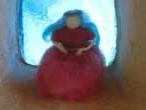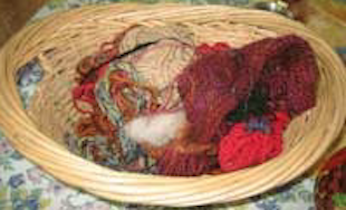
Forest children seedlings
by Tanya Carwyn
The Seedlings Program is the early childhood part of the Forest Children Parents’ Cooperative. It is inspired by Waldorf education, a way of teaching and being with children devised by turn-of-the-last-century scientist and philosopher Rudolf Steiner (who is also the father of bio-dynamic agriculture among other things).
During the first stage of childhood, from birth until around the age of six or seven, children are learning and experiencing the world primarily through physical activity. The Seedlings Program, for children ages three and a half to six, provides plenty of opportunity for learning and meaningful engagement through exploration, creative play, and purposeful work.
Day to day
 Each day in the Seedlings Program follows a gentle rhythm that the children look forward to and that provides them with a sense of security. The day begins with creative free play; an opportunity for children to exercise healthy fantasy. This is also the time for crafts, art, and cooking projects. This time is followed by circle time, during which the children sing and recite verses. Finger plays and rhymes inspire a love of language and develop children’s fine and gross motor skills. Midmorning brings the time for our snack and the children help set the table with beeswax candles and cloth napkins.
Each day in the Seedlings Program follows a gentle rhythm that the children look forward to and that provides them with a sense of security. The day begins with creative free play; an opportunity for children to exercise healthy fantasy. This is also the time for crafts, art, and cooking projects. This time is followed by circle time, during which the children sing and recite verses. Finger plays and rhymes inspire a love of language and develop children’s fine and gross motor skills. Midmorning brings the time for our snack and the children help set the table with beeswax candles and cloth napkins.
After our snack time the children take turns washing the dishes and sweeping the floor. Our work is accompanied by “working songs.” Next we go outside to explore and learn about nature. Sometimes we simply play at the new play ground, other times we go on “wild hunts” through the forest. We often go out to collect things, such as herbs for tea, leaves for crafts, wild greens for salads or hickory nuts for drying. This spring we started a small school vegetable garden and are looking forward to making a scarlet runner bean tipi for playing in (and eating!).
 Soon it is time for our lunch and after that the morning draws to a close with me telling a story or fairy tale. This is a time for listening and quiet reflection. Stories are told from memory, and special attention is paid to the words chosen and pronunciation, in an effort to engage the children’s imaginations fully and allow them to develop their language skills. Every day of the week includes artistic activity such as water color painting, beeswax modeling, drawing with beeswax crayons or other crafts, and dance and movement. Here process is emphasized over product.
Soon it is time for our lunch and after that the morning draws to a close with me telling a story or fairy tale. This is a time for listening and quiet reflection. Stories are told from memory, and special attention is paid to the words chosen and pronunciation, in an effort to engage the children’s imaginations fully and allow them to develop their language skills. Every day of the week includes artistic activity such as water color painting, beeswax modeling, drawing with beeswax crayons or other crafts, and dance and movement. Here process is emphasized over product.
Throughout the morning, the children and I engage in purposeful work such as carding wool, shucking corn, doing dishes, creating useful or beautiful objects, and cleaning up. Practical work provides children with meaningful actions to imitate, and it is through imitation that a child learns.
Our toys are created from natural, simple materials, such as wood, colorful silks, shells and smooth stones so as to be open ended (they can be more than one thing) and beautiful.
 Through out the year we focused on a different theme each month. We learned about farms by visiting Gateway farm and Yellowroot Farm as well as other farms in the area. We learned all about sheep and wool with our “Sheep to Shawl” theme. We visited the sheep and farmers at Gateway Farm. The children helped wash raw wool, then carded it (a coveted activity!) and helped spin it. While some of the older kids are learning to work with a drop spindle (fantastic for small motor skills that are needed for learning to write), I do most of the spinning. We are working with our wool in other ways as well, such as wet felting and weaving. Other themes we have explored include the Autumn Harvest, Winter Holidays, and finally Spring.
Through out the year we focused on a different theme each month. We learned about farms by visiting Gateway farm and Yellowroot Farm as well as other farms in the area. We learned all about sheep and wool with our “Sheep to Shawl” theme. We visited the sheep and farmers at Gateway Farm. The children helped wash raw wool, then carded it (a coveted activity!) and helped spin it. While some of the older kids are learning to work with a drop spindle (fantastic for small motor skills that are needed for learning to write), I do most of the spinning. We are working with our wool in other ways as well, such as wet felting and weaving. Other themes we have explored include the Autumn Harvest, Winter Holidays, and finally Spring.
The children have now graduated to the Saplings Program for 5-10 year olds. Thank you all for your support and welcoming the Seedlings into your day-to-day lives.
Tanya Carwyn has been an exploring member at Earthaven for nearly a year and was the program coordinator of the Seedlings program.
forest children, Gateway Farm, Rudolf Steiner, saplings, seedlings, waldorf, Yellowroot Farm